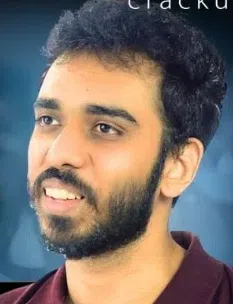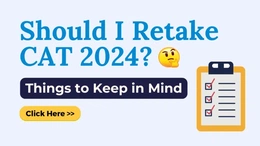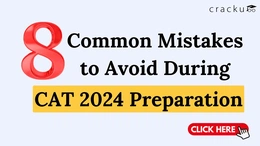Check out the Top Quadratic Equations questions is one of the key topics in the CAT Quant Section (Algebra). The weightage for quadratic equations questions is lower. But these questions will help you boost your score in quant. It is advised to solve the questions that previously appeared in the CAT. To help the aspirants find the quadratic equations questions, we have compiled all the questions that appeared in the previous CAT papers and detailed video solutions explained by CAT experts. You can also download the PDF that contains all these questions with video solutions. And the best part is you can download the PDF for free without signing up.
Question 1
Let m and n be positive integers, If $$x^{2}+mx+2n=0$$ and $$x^{2}+2nx+m=0$$ have real roots, then the smallest possible value of $$m+n$$ is
correct answer:-2
Question 2
The number of integers that satisfy the equality $$(x^{2}-5x+7)^{x+1}=1$$ is
correct answer:-1
Question 3
Let $$f(x) = \frac{x^2 + 1}{x^2 - 1}$$ if $$x \neq 1, -1,$$ and 1 if x = 1, -1. Let $$g(x) = \frac{x + 1}{x - 1}$$ if $$x \neq 1,$$ and 3 if x = 1.
What is the minimum possible values of $$\frac{f(x)}{g(x)}$$ ?
correct answer:-4
Question 4
Suppose hospital A admitted 21 less Covid infected patients than hospital B, and all eventually recovered. The sum of recovery days for patients in hospitals A and B were 200 and 152, respectively. If the average recovery days for patients admitted in hospital A was 3 more than the average in hospital B then the number admitted in hospital A was
correct answer:-35
Question 5
If r is a constant such that $$\mid x^2 - 4x - 13 \mid = r$$ has exactly three distinct real roots, then the value of r is
correct answer:-1
Question 6
Suppose one of the roots of the equation $$ax^{2}-bx+c=0$$ is $$2+\sqrt{3}$$, Where a,b and c are rational numbers and $$a\neq0$$. If $$b=c^{3}$$ then $$\mid a\mid$$ equals.
correct answer:-2
Question 7
For all real values of x, the range of the function $$f(x)=\frac{x^{2}+2x+4}{2x^{2}+4x+9}$$ is:
correct answer:-4
Question 8
Consider the pair of equations: $$x^{2}-xy-x=22$$ and $$y^{2}-xy+y=34$$. If $$x>y$$, then $$x-y$$ equals
correct answer:-4
Question 9
Some members of a social service organization in Kolkata decide to prepare 2400 laddoos to gift to children in various orphanages and slums in the city, during Durga puja. The plan is that each of them makes the same number of laddoos. However, on the laddoo-making day, ten members are absent, thus each remaining member makes 12 laddoos more than earlier decided.
How many members actually make the laddoos?
correct answer:-5
Question 10
The sum of the cubes of two numbers is 128, while the sum of the reciprocals of their cubes is 2.
What is the product of the squares of the numbers?
correct answer:-3
Question 11
Let a, b, c be non-zero real numbers such that $$b^2 < 4ac$$, and $$f(x) = ax^2 + bx + c$$. If the set S consists of all integers m such that f(m) < 0, then the set S must necessarily be
correct answer:-3
Question 12
Let r and c be real numbers. If r and -r are roots of $$5x^{3} + cx^{2} - 10x + 9 = 0$$, then c equals
correct answer:-1
Question 13
Suppose k is any integer such that the equation $$2x^{2}+kx+5=0$$ has no real roots and the equation $$x^{2}+(k-5)x+1=0$$ has two distinct real roots for x. Then, the number of possible values of k is
correct answer:-1
Question 14
If $$(3+2\sqrt{2})$$ is a root of the equation $$ax^{2}+bx+c=0$$ and $$(4+2\sqrt{3})$$ is a root of the equation $$ay^{2}+my+n=0$$ where a, b, c, m and n are integers, then the value of $$(\frac{b}{m}+\frac{c-2b}{n})$$ is
correct answer:-4
Question 15
The minimum possible value of $$\frac{x^{2} - 6x + 10}{3-x}$$, for $$x < 3$$, is
correct answer:-2
Question 16
The equation $$x^{3} + (2r + 1)x^{2} + (4r - 1)x + 2 =0$$ has -2 as one of the roots. If the other two roots are real, then the minimum possible non-negative integer value of r is
correct answer:-2
Question 17
Let $$\alpha$$ and $$\beta$$ be the two distinct roots of the equation $$2x^{2} - 6x + k = 0$$, such that ( $$\alpha + \beta$$) and $$\alpha \beta$$ are the distinct roots of the equation $$x^{2} + px + p = 0$$. Then, the value of 8(k - p) is
correct answer:-6
Question 18
A quadratic equation $$x^2 + bx + c = 0$$ has two real roots. If the difference between the reciprocals of the roots is $$\frac{1}{3}$$, and the sum of the reciprocals of the squares of the roots is $$\frac{5}{9}$$, then the largest possible value of $$(b + c)$$ is
correct answer:-9
Question 19
The sum of all possible values of x satisfying the equation $$2^{4x^{2}}-2^{2x^{2}+x+16}+2^{2x+30}=0$$, is
correct answer:-4
Question 20
Let k be the largest integer such that the equation $$(x-1)^{2}+2kx+11=0$$ has no real roots. If y is a positive real number, then the least possible value of $$\frac{k}{4y}+9y$$ is
correct answer:-6

















![Most Important CAT Averages Questions [PDF] Most Important CAT Averages Questions [PDF]](/media/cache/54/e8/54e80dac6301b8d404ec410ed272b262.webp)
















